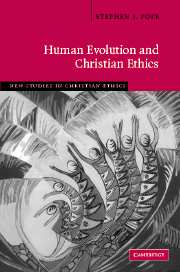Book contents
- Frontmatter
- Contents
- General editor's preface
- Acknowledgments
- Introduction
- Chapter 1 Evolution and religion
- Chapter 2 The indifference of Christian ethics to human evolution
- Chapter 3 Varieties of reductionism
- Chapter 4 Faith, creation, and evolution
- Chapter 5 Chance and purpose in evolution
- Chapter 6 Human nature and human flourishing
- Chapter 7 Freedom and responsibility
- Chapter 8 Human dignity and common descent
- Chapter 9 Christian love and evolutionary altruism
- Chapter 10 The natural roots of morality
- Chapter 11 Natural law in an evolutionary context
- Chapter 12 Sex, marriage, and family
- Bibliography
- Index of scriptural citations
- Index of names and subjects
Chapter 5 - Chance and purpose in evolution
Published online by Cambridge University Press: 26 June 2009
- Frontmatter
- Contents
- General editor's preface
- Acknowledgments
- Introduction
- Chapter 1 Evolution and religion
- Chapter 2 The indifference of Christian ethics to human evolution
- Chapter 3 Varieties of reductionism
- Chapter 4 Faith, creation, and evolution
- Chapter 5 Chance and purpose in evolution
- Chapter 6 Human nature and human flourishing
- Chapter 7 Freedom and responsibility
- Chapter 8 Human dignity and common descent
- Chapter 9 Christian love and evolutionary altruism
- Chapter 10 The natural roots of morality
- Chapter 11 Natural law in an evolutionary context
- Chapter 12 Sex, marriage, and family
- Bibliography
- Index of scriptural citations
- Index of names and subjects
Summary
The major counter-position to the previous chapter's theological interpretation of evolution comes from evolutionists who argue that the evolutionary process is so pervaded by chance and contingency that it cannot possibly be described as a “purposeful” divine creation. If true, neo-Darwinism would undercut the religious foundations of Christian ethics. If evolution is not part of a purposeful world, Christian convictions are false and Christian ethics is an exercise in futility and self-deception.
The neo-Darwinian approach to purpose in nature is best understood in light of the broad shift of modern philosophy and theology away from ancient and medieval habits of discerning teleology, or final causality, or intrinsic ends, in nature. The modern project proceeded on the assumption that nature is best explained mechanistically, that is, in terms of efficient and material rather than formal and final causes. Christian ethics, on the other hand, has traditionally understood the natural world to constitute an overarching finality reflecting the purposive wisdom of the Creator.
This chapter addresses the question of whether knowledge of evolutionary contingency does indeed provide evidence for the supposition that nature is purposeless. I will first examine the argument for this position advanced by S. J. Gould and then the replies to it by biologist Simon Conway Morris and by astronomer William Stoeger, SJ. The latter two thinkers provide reasonable support for thinking that evolutionary directionality is consistent with a religiously based belief in the divine purpose of evolution.
- Type
- Chapter
- Information
- Human Evolution and Christian Ethics , pp. 111 - 128Publisher: Cambridge University PressPrint publication year: 2007



